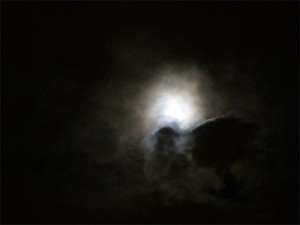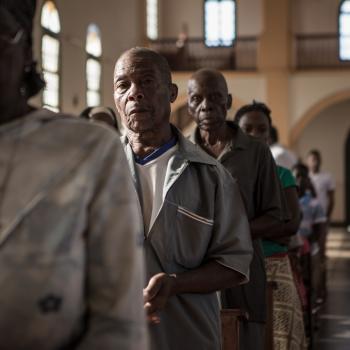 What came before “there was evening and there was morning, a first day,” and “there was evening and there was morning, a second day,” and “there was evening and there was morning, a third day,” and so on until “the heaven and earth were finished” and God “ceased on the seventh day from all the work that He had done,” and “God blessed the seventh day and declared it holy”?
What came before “there was evening and there was morning, a first day,” and “there was evening and there was morning, a second day,” and “there was evening and there was morning, a third day,” and so on until “the heaven and earth were finished” and God “ceased on the seventh day from all the work that He had done,” and “God blessed the seventh day and declared it holy”?
In other words, what came before numbering our days, one through seven?
Before light, darkness. Before light, no colors. Before light, no vast distances. In darkness, I reach out cautiously and touch this dark shape and it’s smooth, that dark shape and it’s sharp, and I cry into the darkness and the darkness replies with darkness. Before light, the name of the box turtle and the eucalyptus and the harp-shaped lake and the ibis and the cave are one: Darkness. Before light, no before. Darkness is.
And then it dissolves. Like a black aspirin in water. So much water that the blackness gradually gives way, black to murky gray to clear.
Now light is. Light is silver and plum, light is feathered and furrowed, light is the frosted wave washing ashore and the ragged border where sea meets land, land meets sea, and all the way to the horizon where day meets day meets night meets day.
And light is: memory. The first memory: There was darkness.
And light is: question. The first question: Will darkness return?
Again. Before light, darkness. In that darkness—all there was—no question, no yearning.
Then there was light. And any creatures stunned by light, any form of life that favored darkness, created this: yearning. Yearning for darkness.
And there was evening, and there was morning, and there was evening. And those creatures that came to light in light, who favored light, yearned for light.
And there was evening, and there was vanishing. And there was morning, and there was vanishing.
And there was evening, and there was morning, and we were born into this: vanishing.
And we were born into this: yearning.
Soul mates: vanishing/yearning.
No, not mates: not two souls
joined/separated
by a thin forward slash.
One Soul.
From Oneness we come. To Oneness we return.
Hear, O Israel, Y-H-V-H is Our God, Y-H-V-H is VanishingYearning (VY) (One).
Sometime after the cycle repeated itself (evening morning evening morning), there was this: numbering. The days were numbered: first, second, third, and so on until sixth. Then counting stopped. But the days were not over. After counting stopped, this: Shabbat. And creation was complete.
Six + one.
Six days + Shabbat.
And + And.
Addition. But…
Addition never travels alone. Subtraction is its constant companion. The one does not exist without the other. Thus, AdditionSubstraction are One. Here, O Israel, here, right here.
Evening and morning, a day is given. Then that day is taken away.
Each day, in Jewish tradition, is a psalm, its own psalm.
The psalm of the first day, Psalm 24, is given: The earth and the world, nature and culture, all belong to Y-H-V-H. There is evening, and there is morning, then Psalm 24 is taken away.
The psalm of the second day, Psalm 48, is given: Adonai is great in God’s city, on God’s mountain in God’s city, in God’s Temple on God’s mountain in God’s city. From earth to mountain, and from world to city and city to Temple in that city: how much is taken away!
But this, too, is given: memory of the first day, when all the earth and world were God’s. As God’s domain shrunk, God’s power became concentrated in one place on earth. The psalmist who was given to see this, was also given this: the power to see where this story is heading: to the loss even of Zion.
That’s why the psalmist instructs his people to “walk all about Zion, encircle her.” Not to protect and defend her, at least not in a military sense, but to “count her towers, review her ramparts, scan her citadels” so as to be able to “tell her story to later generations.” Haunted by loss and the inevitability of future losses, the psalmist (or the rabbis who chose each of the daily psalms and arranged them in this order) imagines what cannot be lost: story. Story: the best defense against vanishing.
There is evening and morning, and evening and morning, and evening and morning, and the psalms of the third, fourth, and fifth days. A psalm of God’s weakness—God’s misjudging of others (lesser gods who pervert justice by favoring the wicked over the weak)—then clear seeing: “I thought you were Godlike…but you will die like mortals” (Psalm 82). A cry to the God of vengeance from God’s people who are being crushed and oppressed by evildoers (Psalm 94). A warning by God: “There shall be no strange god in your midst…. I am Adonai your God who brought you up out of Egypt.” But Israel does not listen (Psalm 81).
The fourth day is linked to the third with an emphasis on justice, the fifth day to the fourth with an emphasis on listening and the failure to listen. Against vanishing, the psalm of one day extends the vision of the psalm of the day that has just vanished.
And there is evening and there is morning, and the psalm of the sixth day is given.
Your kingdom stands from earliest time.
You are eternal.
From earliest time: from the beginning of numbering our days. Our finite, vanishing days. Eternal: a concept imaginable only by those whose days are numbered. Eternal: from God’s point of view? Who knows? One day, we may know. Perhaps on the day when, at the conclusion of our daily and Sabbath prayers, quoting Zachariah, we sing, God is One and God’s Name is One.
Richard Chess is the author of three books of poetry, Tekiah, Chair in the Desert, and Third Temple. Poems of his have appeared in Telling and Remembering: A Century of American Jewish Poetry, Bearing the Mystery: Twenty Years of IMAGE, and Best Spiritual Writing 2005. He is the Roy Carroll Professor of Honors Arts and Sciences at the University of North Carolina at Asheville. He is also the director of UNC Asheville’s Center for Jewish Studies.











